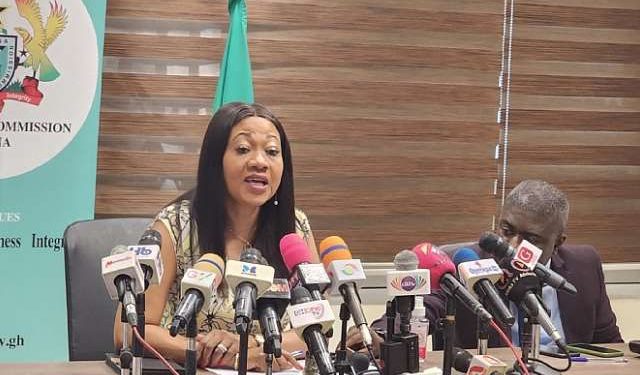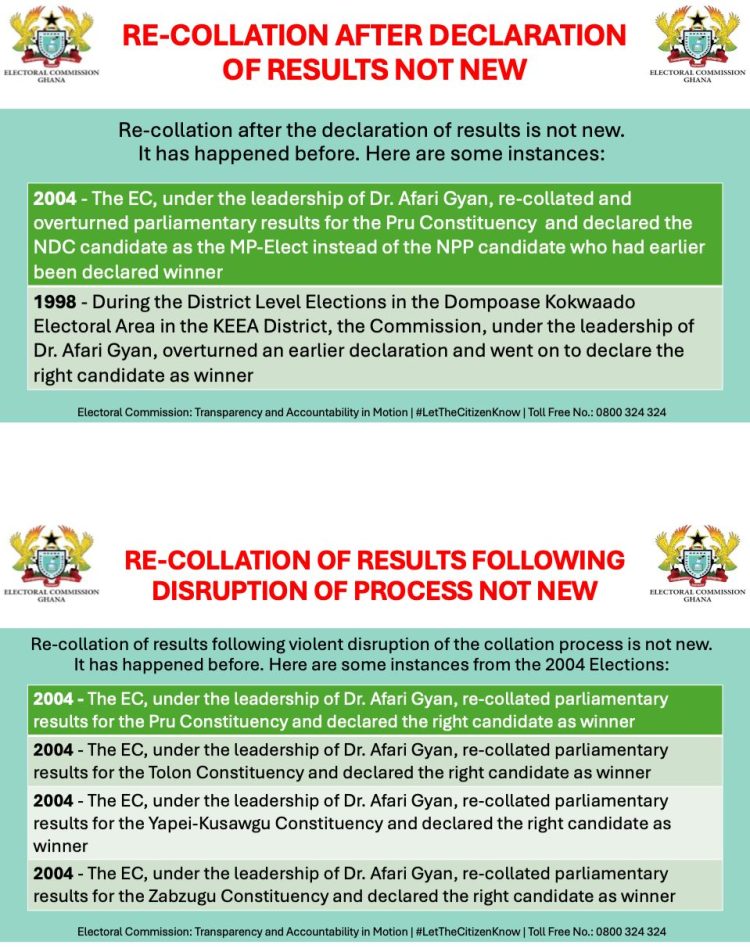The Electoral Commission (EC) of Ghana has defended its decision to re-collate election results in nine constituencies, stating that this practice is not unprecedented in the country’s electoral history.
In a statement shared on social media, the EC explained that re-collating results after the initial declaration is a standard procedure aimed at ensuring accuracy and fairness in the electoral process. The Commission emphasized that such actions have occurred in previous elections.

“Re-collation after the declaration of results is not new. It has happened before,” the EC stated, providing examples from past elections:
1998: During the district-level elections in the Dompose Kokwaado Electoral Area in the KEEA District, the EC, led by Dr. Afari Gyan, overturned an initial result and declared the correct winner.
2004: Under Dr. Afari Gyan’s leadership, the EC re-collated parliamentary results in the Pru Constituency, reversing the initial outcome and declaring the National Democratic Congress (NDC) candidate as the winner over the New Patriotic Party (NPP) candidate.
3. 2004: The Tolon Constituency results were re-collated, and the correct candidate was declared the winner.
4. 2004: Re-collation also took place in the Yapei-Kusawgu Constituency, leading to the declaration of the rightful winner.
5. 2004: Similarly, in the Zabzugu Constituency, a re-collation resulted in the correct candidate being declared as the winner.

The EC’s decision to re-collate results for the nine constituencies has sparked public debate, with critics questioning the timing and potential impact of the move.
However, the Commission insists that its actions are consistent with its mandate to ensure free, fair, and credible elections.
It emphasized that re-collation is a corrective measure to address discrepancies and ensure the declared results accurately reflect the will of the people.























































![[FREE FREE MONEY] Predict and Win a Guaranteed GH¢200 From Us EVERY WEEK](https://wordpress.ghanatalksradio.com/wp-content/uploads/2022/02/Predict-and-Win-Final-09-03-2021-218x150.jpg)
![[Predict & Win – 8th/Oct.] WIN A Guaranteed ¢200 From Us This Week](https://wordpress.ghanatalksradio.com/wp-content/uploads/2021/10/maxresdefault-16-218x150.jpg)
![[Predict & Win – 2nd] WIN A Guaranteed ¢200 From Us This Week](https://wordpress.ghanatalksradio.com/wp-content/uploads/2021/09/maxresdefault-50-218x150.jpg)
![[Predict & Win – 25th] WIN A Guaranteed ¢200 From Us This Week](https://wordpress.ghanatalksradio.com/wp-content/uploads/2021/09/maxresdefault-36-218x150.jpg)
![[Predict & Win – 18th] WIN A Guaranteed ¢200 From Us This Week](https://wordpress.ghanatalksradio.com/wp-content/uploads/2021/09/maxresdefault-23-218x150.jpg)








![[National cathedral] See full list of churches that have contributed since 2018](https://wordpress.ghanatalksradio.com/wp-content/uploads/2020/09/Ghana-National-Cathedral-GhanaTalksRadio-100x70.jpg)



